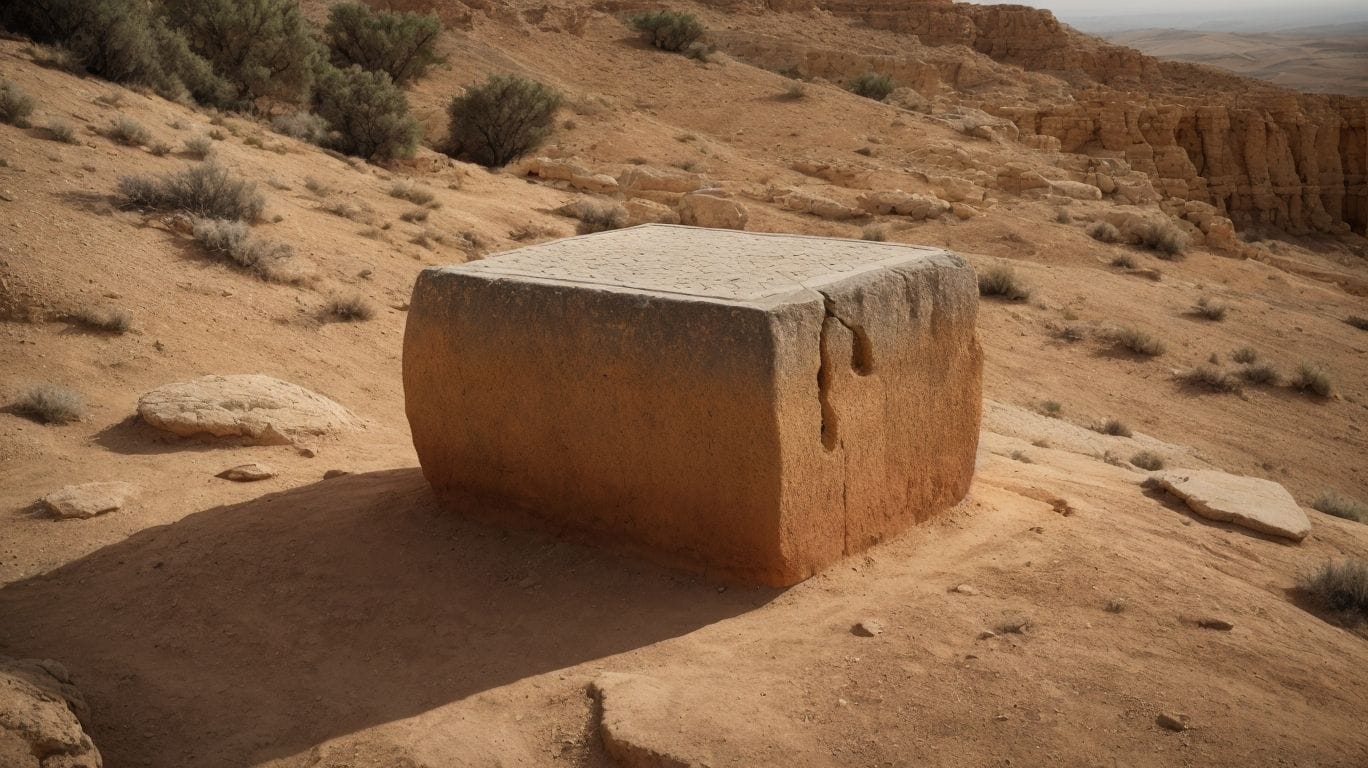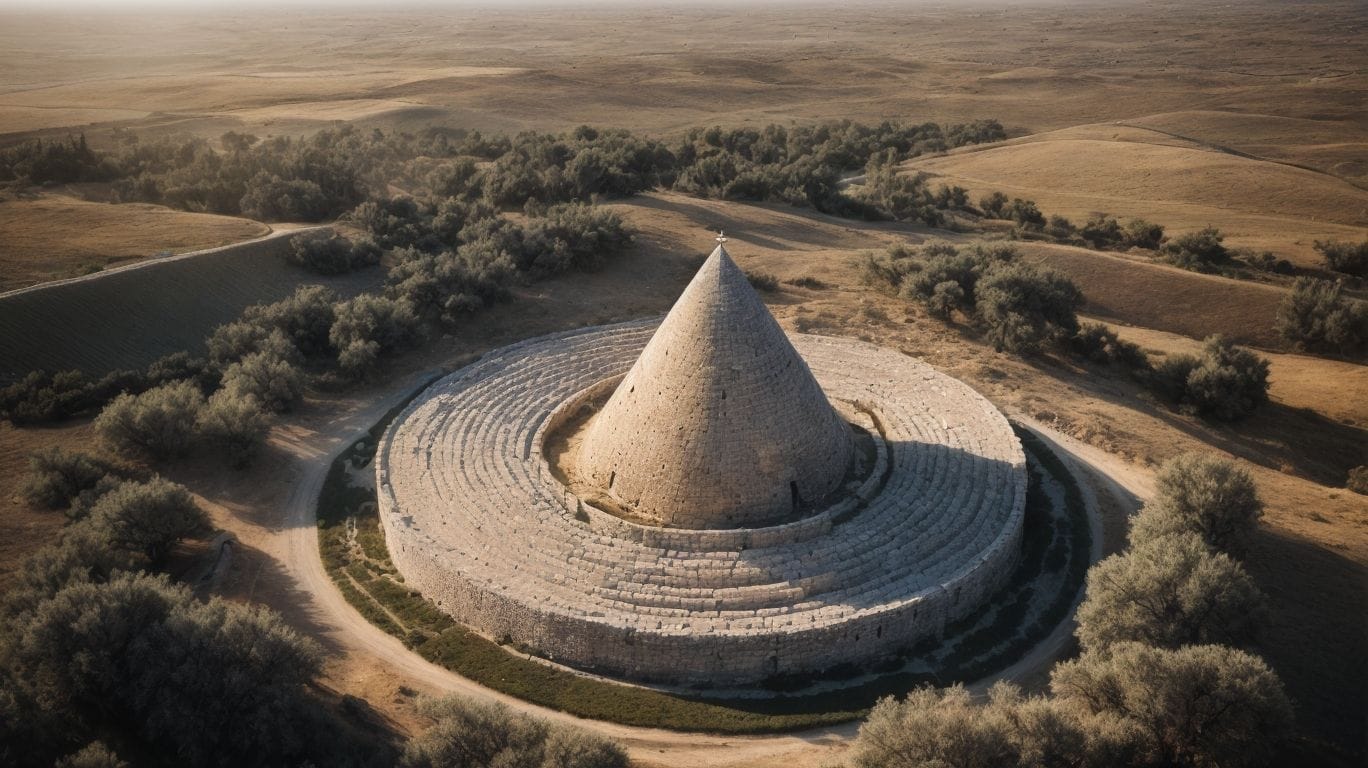The 12 Stones of Israel refer to the twelve stones that were placed in the Jordan River by the Israelites after they crossed over into Canaan, as mentioned in the Bible’s book of Joshua. These stones were taken from the riverbed and carried to the other side, where they were arranged as a memorial in remembrance of God’s faithfulness and as a witness to future generations.
The story behind the 12 stones is significant in the history of Israel and holds great spiritual significance for believers. After crossing the Jordan River, Joshua commanded twelve men, one from each tribe, to take a stone from the riverbed and carry it to the other side. These stones were then used to build an altar to the Lord as a reminder of their journey and God’s faithfulness.
The 12 stones represent several things in the biblical narrative:
- God’s promise to the Israelites to bring them to the promised land.
- Each of the twelve stones also represents one of the twelve tribes of Israel, symbolizing the unity and brotherhood among the tribes.
- Lastly, the 12 stones serve as a reminder of God’s power and faithfulness in fulfilling His promises.
The lessons we can learn from the 12 stones are numerous. They remind us of the importance of remembering God’s faithfulness in our lives and the power of unity and brotherhood among believers. The stones also teach us the importance of trusting in God’s promises and having faith in His plans for our lives.
We can apply the meaning of the 12 stones in our lives by building altars of remembrance, just as the Israelites did, to remind us of God’s faithfulness and provision. We can also embrace unity and brotherhood with our fellow believers and strengthen our faith in God’s promises by regularly reading and meditating on His word. The 12 stones serve as a reminder for us to trust in God and His plans for our lives.
Key Takeaways:
- The 12 stones of Israel represent God’s promise, unity among the tribes, and a reminder of His power and faithfulness.
- Lessons from the 12 stones include remembering God’s faithfulness, the power of unity, and trusting in His promises.
- We can apply the meaning of the 12 stones in our lives by building altars of remembrance, embracing unity, and strengthening our faith in God’s promises.
What Are The 12 Stones of Israel?

Photo Credits: 777Legion.Com by Bobby Anderson
The 12 Stones of Israel are a crucial aspect of biblical history. According to the book of Joshua, these stones were specifically chosen to represent the 12 tribes of Israel. Joshua erected them as a memorial after the Israelites crossed the Jordan River. They served as a symbol of unity and a constant reminder of God’s faithfulness.
The Book of Joshua provides specific details about the stones and their locations. In Jewish tradition, the 12 Stones of Israel hold immense significance and serve as a reminder of their ancestral heritage and the covenant with God.
Why Are The 12 Stones Significant?

Photo Credits: 777Legion.Com by Jack Hall
The 12 stones mentioned in the Bible hold great significance in both religious and historical contexts. They represent the twelve tribes of Israel, symbolizing unity and identity among the people. These stones were often used to construct altars or memorial pillars, serving as a reminder of important events or covenants.
For instance, Joshua used twelve stones from the Jordan River to build a memorial, commemorating God’s faithfulness in parting the waters for the Israelites to cross into the Promised Land. The 12 stones are a powerful symbol, reminding future generations of the past and testifying to the faith and history of the Israelite people.
What Is The Story Behind The 12 Stones?

Photo Credits: 777Legion.Com by Jack Gonzalez
The 12 stones of Israel hold a significant story in the history and beliefs of the Jewish people. These stones represent the 12 tribes of Israel and have a symbolic meaning that has been passed down for generations. In this section, we will delve into the story behind these 12 stones, starting with the 12 tribes of Israel and how they came to be represented by these stones. We will also explore the event of crossing the Jordan River and the role these stones played in it, as well as the significance of building an altar with these stones.
1. The Twelve Tribes of Israel
The twelve tribes of Israel were integral to the history and identity of the Israelite people. Understanding the significance of these tribes is crucial in comprehending biblical narratives and the formation of the nation of Israel.
Here are the key steps to understanding the twelve tribes of Israel:
- The twelve tribes originated from the twelve sons of Jacob.
- Each tribe had its unique characteristics, responsibilities, and territories.
- The tribes were named after Jacob’s sons: Reuben, Simeon, Levi, Judah, Issachar, Zebulun, Joseph, Benjamin, Dan, Naphtali, Gad, and Asher.
- These tribes formed the foundation of Israelite society, with each tribe having its leader and fulfilling a distinct role.
Fun Fact: The descendants of these twelve tribes still exist today, with some Jewish people identifying themselves as belonging to a specific tribe based on their family history.
2. Crossing The Jordan River
When the Israelites crossed the Jordan River, it was a significant event in their history. Here are the steps involved in this event:
- As the Israelites approached the Jordan River, God instructed Joshua to command the priests carrying the Ark of the Covenant to step into the river.
- When the priests’ feet touched the water, the Jordan River miraculously stopped flowing, allowing the Israelites to cross on dry land.
- Approximately 40,000 Israelite warriors crossed the Jordan River before the priests carrying the Ark of the Covenant stepped out of the riverbed, and the river resumed its normal flow.
Pro-tip: Just as the Israelites trusted in God’s guidance and experienced His miraculous intervention, we can also trust in God and step out in faith, knowing that He will make a way for us.
3. Building An Altar
Building an altar was a crucial step in the story of the 12 stones of Israel. Here are the steps involved:
- Select a location: Choose a suitable place to construct the altar, typically near the Jordan River or on Mount Ebal.
- Gather materials: Collect stones from the river or surrounding area to use in building the altar.
- Arrange the stones: Carefully place the stones to ensure stability and create a solid structure.
- Offer sacrifices: Present burnt offerings and peace offerings on the altar as a symbol of devotion to God.
- Seek God’s presence: Pray and seek God’s guidance and blessings at the altar.
Building an altar served as a reminder of God’s faithfulness and power, reinforcing the significance of the 12 stones and the covenant between God and the Israelites.
What Do The 12 Stones Represent?

Photo Credits: 777Legion.Com by Edward Davis
The 12 stones of Israel hold great significance and symbolism in biblical history. Each stone represents a unique aspect of the relationship between God and the Israelites. In this section, we will delve into the deep meaning behind the 12 stones and what they represent. From God’s promise to the Israelites to the unity and brotherhood among the tribes and a reminder of God’s power and faithfulness, these stones serve as powerful reminders of the covenant between God and his chosen people.
1. God’s Promise to the Israelites
God’s promise to the Israelites is a significant aspect of the story behind the 12 stones. Here are the steps that highlight this promise:
- God promised Abraham that he would make his descendants into a great nation.
- God fulfilled this promise by multiplying the Israelites into 12 tribes.
- God led the Israelites out of slavery in Egypt and guided them to the promised land.
- As a symbol of this promise, Joshua instructed 12 men, one from each tribe, to take a stone from the Jordan River.
- These 12 stones were then used to build an altar, serving as a reminder of God’s faithfulness.
This true history showcases how God’s promise to the Israelites was fulfilled through their journey to the promised land, solidifying their faith in His faithfulness.
2. Unity and Brotherhood among the Tribes
The significance of the 12 Stones of Israel extends to promoting unity and brotherhood among the tribes. These stones were used to construct an altar, symbolizing the collective strength of the Israelites. They served as a reminder of their shared heritage and their reliance on one another. The stones represented the importance of standing together during times of hardship and celebrating victories as a united community.
Today, we can learn from this lesson by valuing unity and brotherhood in our own lives and recognizing that we are stronger when we come together. Fun fact: Each of the 12 stones was engraved with the name of one of the 12 tribes of Israel.
3. A Reminder of God’s Power and Faithfulness
The 12 stones of Israel serve as a powerful reminder of God’s power and faithfulness. Here are three steps to understand their significance:
- Remember God’s miracles: Reflect on the biblical accounts of the Israelites crossing the Jordan River and building an altar with the 12 stones.
- Recognize divine promises: Understand that the 12 stones symbolize God’s covenant with the Israelites and His faithfulness to fulfill His promises.
- Embrace God’s power: Meditate on the stones as a testament to God’s might and goodness, providing strength and encouragement in difficult times.
Fun fact: The 12 stones were placed in the Jordan River to serve as a visible reminder of God’s miraculous parting of the waters.
What Are The Lessons We Can Learn From The 12 Stones?

Photo Credits: 777Legion.Com by Joseph Martin
The 12 Stones of Israel hold deep significance in the biblical narrative as they symbolize the journey and faith of the Israelites. Beyond their historical context, these stones also hold valuable lessons for us today. In this section, we will explore the three key lessons we can learn from the 12 stones. From the importance of remembering God’s faithfulness to the power of unity and brotherhood and the significance of trusting in God’s promises, each sub-section will offer insights into how we can apply these lessons in our own lives.
1. The Importance of Remembering God’s Faithfulness
Remembering God’s faithfulness is crucial for our spiritual growth and relationship with Him. Here are three steps to emphasize the significance of this:
- Reflect on past experiences: Take time to recall instances where God has shown His faithfulness in your life.
- Keep a gratitude journal: Write down daily blessings and answered prayers to cultivate a grateful heart.
- Share testimonies: Share your personal stories of God’s faithfulness with others to encourage and inspire them in their faith journey.
2. The Power of Unity and Brotherhood
Unity and brotherhood are powerful themes represented by the 12 stones of Israel. These stones symbolize the unity among the 12 tribes and their bond as a community. They serve as a reminder of the strength that comes from standing together and supporting one another.
The story behind the 12 stones, such as crossing the Jordan River and building an altar, highlights the significance of unity and brotherhood in overcoming challenges. We can learn from the 12 stones the importance of fostering unity, embracing brotherhood, and working together towards a common goal. Applying these principles in our lives can lead to stronger relationships and a sense of community.
3. Trusting in God’s Promises
Trusting in God’s promises is an essential aspect of faith. Here are steps to help foster trust in God’s promises:
- Study God’s Word: Understand the promises He has made through Scripture.
- Reflect on His faithfulness: Recall instances where God has fulfilled His promises in the past.
- Pray for guidance: Seek God’s wisdom and direction in all areas of life, including trusting in His promises.
- Develop a personal relationship with God: Cultivate intimacy with Him through prayer and worship, strengthening your trust in His promises.
- Surround yourself with a supportive community: Connect with fellow believers who can encourage and strengthen your trust in God’s promises.
- Choose to trust: Make a conscious decision to believe in God’s promises, even in challenging circumstances.
- Take action in line with God’s promises: Step out in faith and align your actions with what God has promised, trusting in His plans for you.
How Can We Apply the Meaning of the 12 Stones in Our Lives?

Photo Credits: 777Legion.Com by Kenneth Lopez
The 12 stones of Israel hold significant meaning and symbolism in the Bible. They serve as a reminder of God’s faithfulness and the journey of the Israelites. But how can we apply this meaning in our own lives? In this section, we will explore three ways we can incorporate the lessons of the 12 stones into our daily lives. From building altars of remembrance to embracing unity and strengthening our faith, these practices can help us deepen our relationship with God and find guidance and strength in our journeys.
1. Building Altars of Remembrance
To create altars of remembrance, follow these steps:
- Choose a significant event or moment in your life that you want to remember and honor.
- Select a location for your altar, such as a special corner in your home or a peaceful outdoor space.
- Gather materials that hold meaning for you, such as photographs, mementos, or symbols related to the event.
- Create a focal point for your altar, such as a small table or shelf, and decorate it with items that represent the event or moment.
- Arrange the photographs, mementos, or symbols on the altar in a way that feels meaningful to you.
- Take time regularly to visit your altar, reflect on the event or moment it represents, and express gratitude for the memories associated with it.
Building altars of remembrance allows us to honor and cherish important moments in our lives, fostering a sense of gratitude and connection to our past. By dedicating a physical space to these memories, we can find comfort, inspiration, and a reminder of the beauty and significance of our life experiences.
2. Embracing Unity and Brotherhood
Embracing unity and brotherhood is crucial when considering the significance of the 12 stones of Israel.
- Recognize that the 12 stones symbolize the unity of the 12 tribes of Israel.
- Understand that these tribes were descendants of the 12 sons of Jacob, representing a shared heritage.
- Appreciate the importance of unity in facing challenges and achieving common goals.
- Embrace the concept of brotherhood, fostering strong relationships and support among individuals.
- Recognize that unity and brotherhood lead to strength, resilience, and collective progress.
- Apply these principles in your own life by promoting unity in your community, family, or workplace.
- Promote brotherhood by supporting and uplifting others, fostering a sense of belonging and inclusivity.
3. Strengthening Our Faith in God’s Promises
To strengthen our faith in God’s promises, we can take the following steps:
- Study the Scriptures: Deepen our understanding of God’s promises by studying and meditating on His Word.
- Pray: Seek God’s guidance and ask Him to strengthen our faith in His promises.
- Reflect on Past Experiences: Recall times when God has been faithful in keeping His promises and use those experiences as a foundation for trust.
- Surround Ourselves with Believers: Connect with a community of believers who can encourage and support us in our faith journey.
- Practice Gratitude: Cultivate a grateful heart and regularly thank God for His faithfulness in our lives.
- Step Out in Faith: Take bold steps of obedience, trusting in God’s promises, even when circumstances may seem uncertain.
- Lean on God’s Strength: Rely on God’s strength and power to help us overcome doubt and fear, knowing that He is faithful to fulfill His promises.


